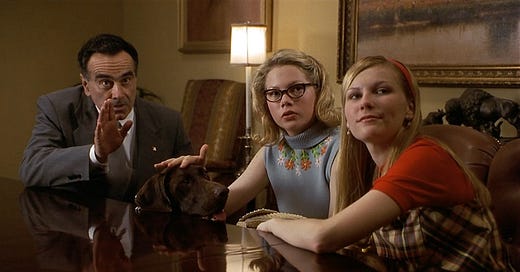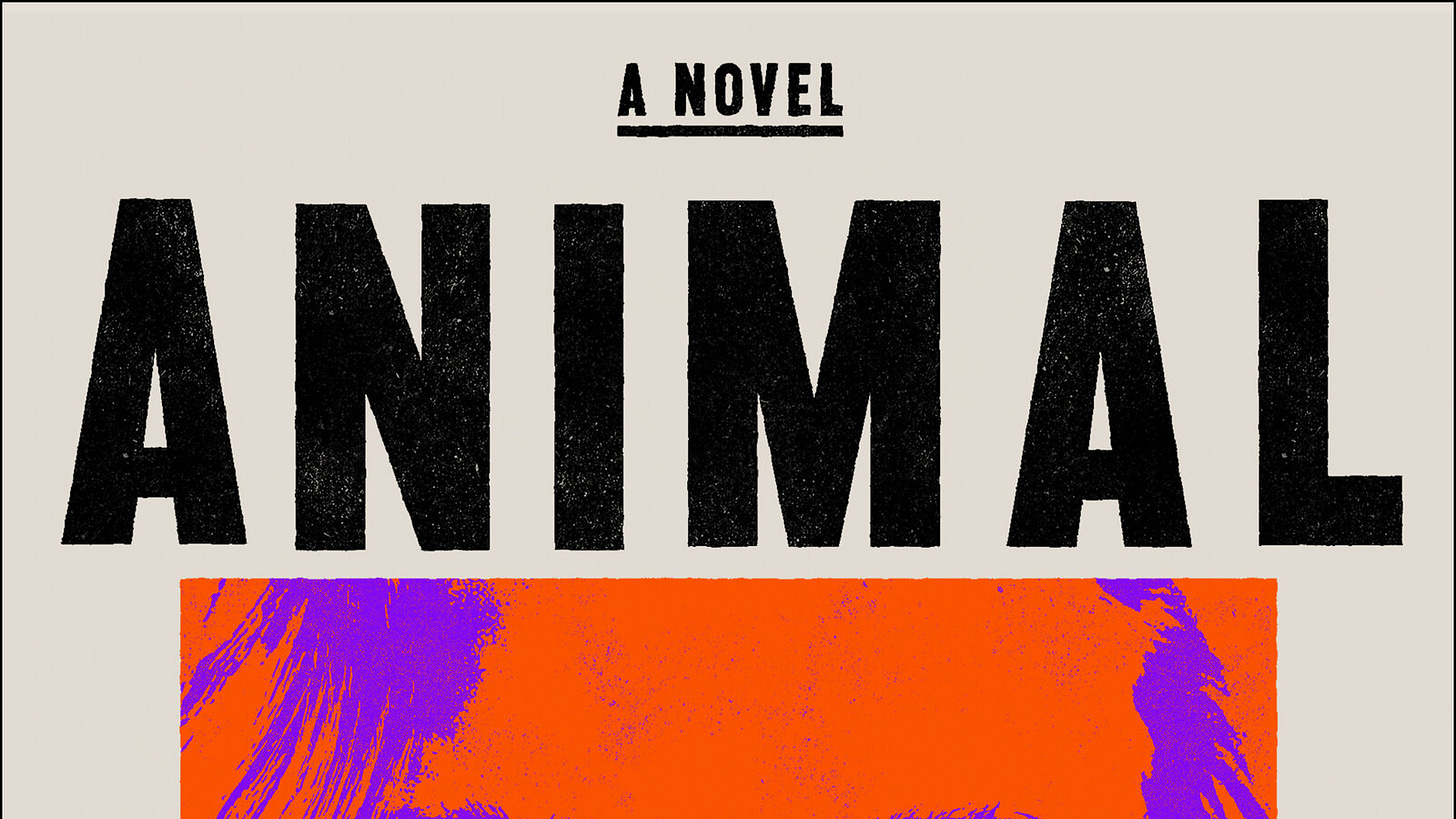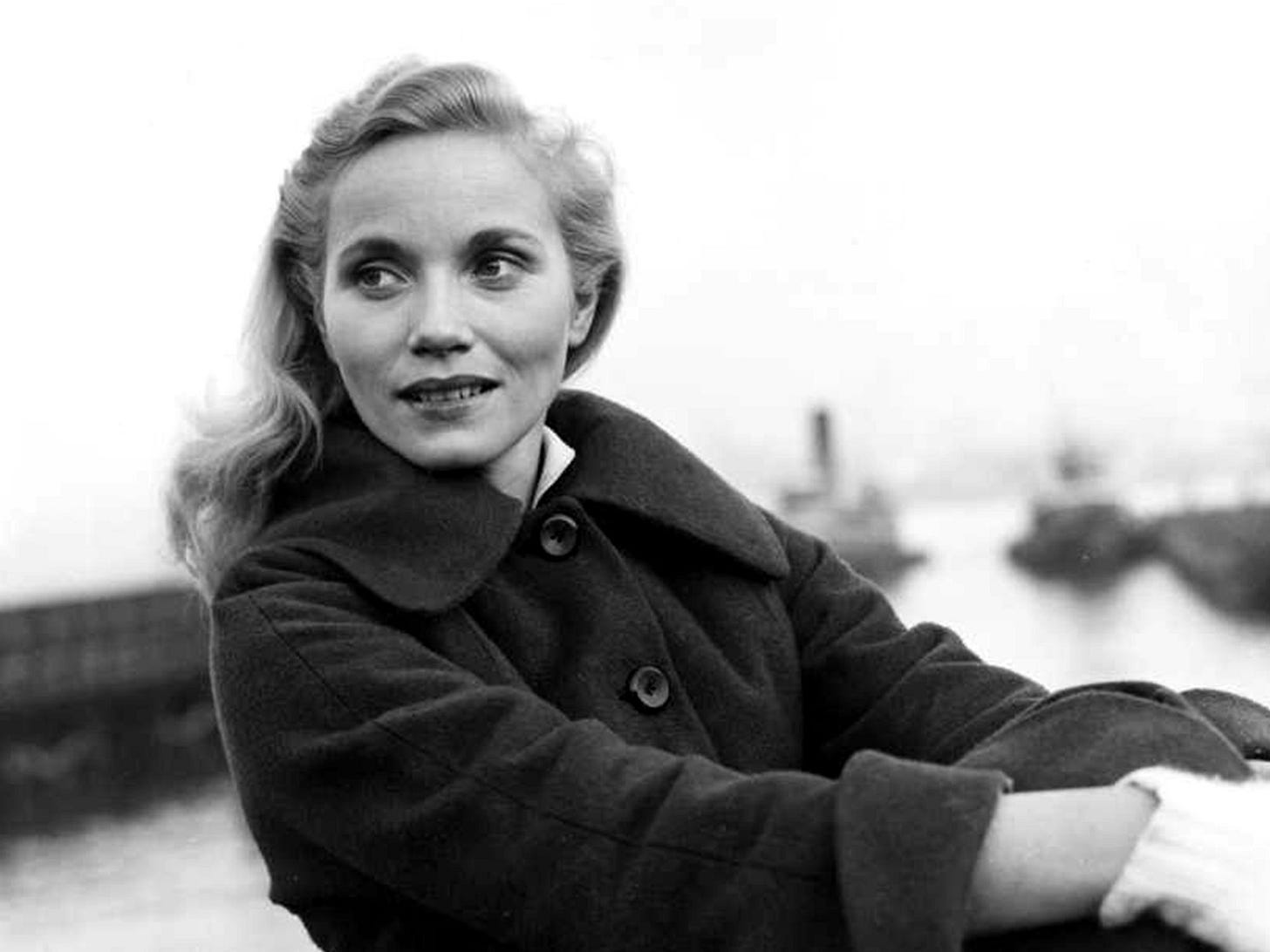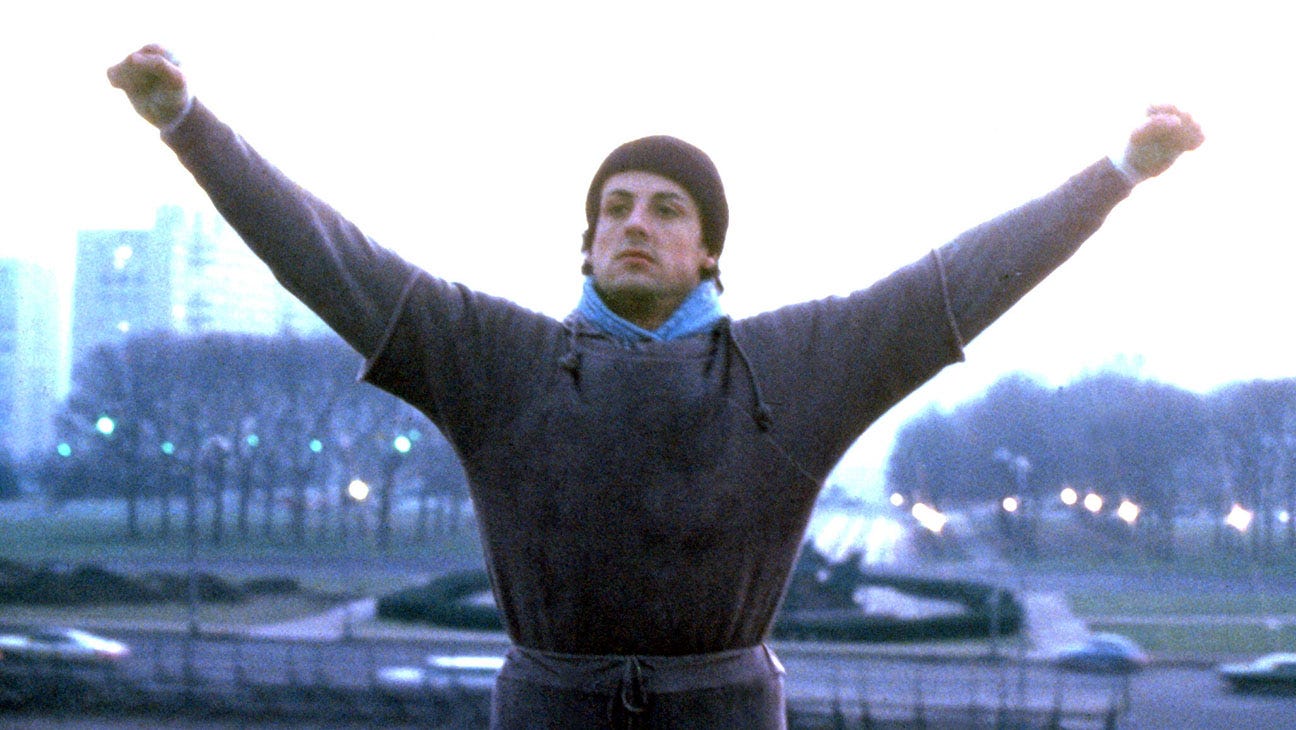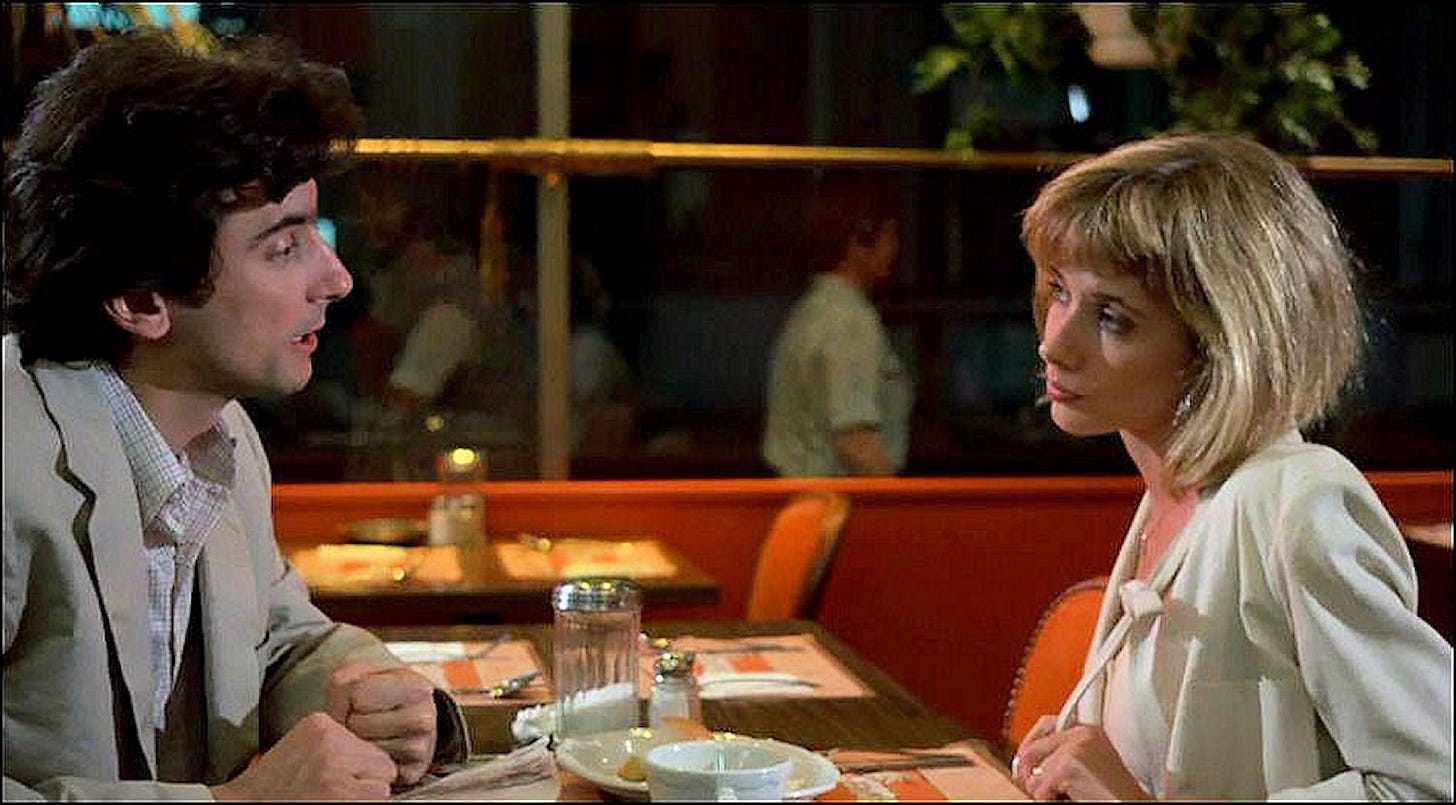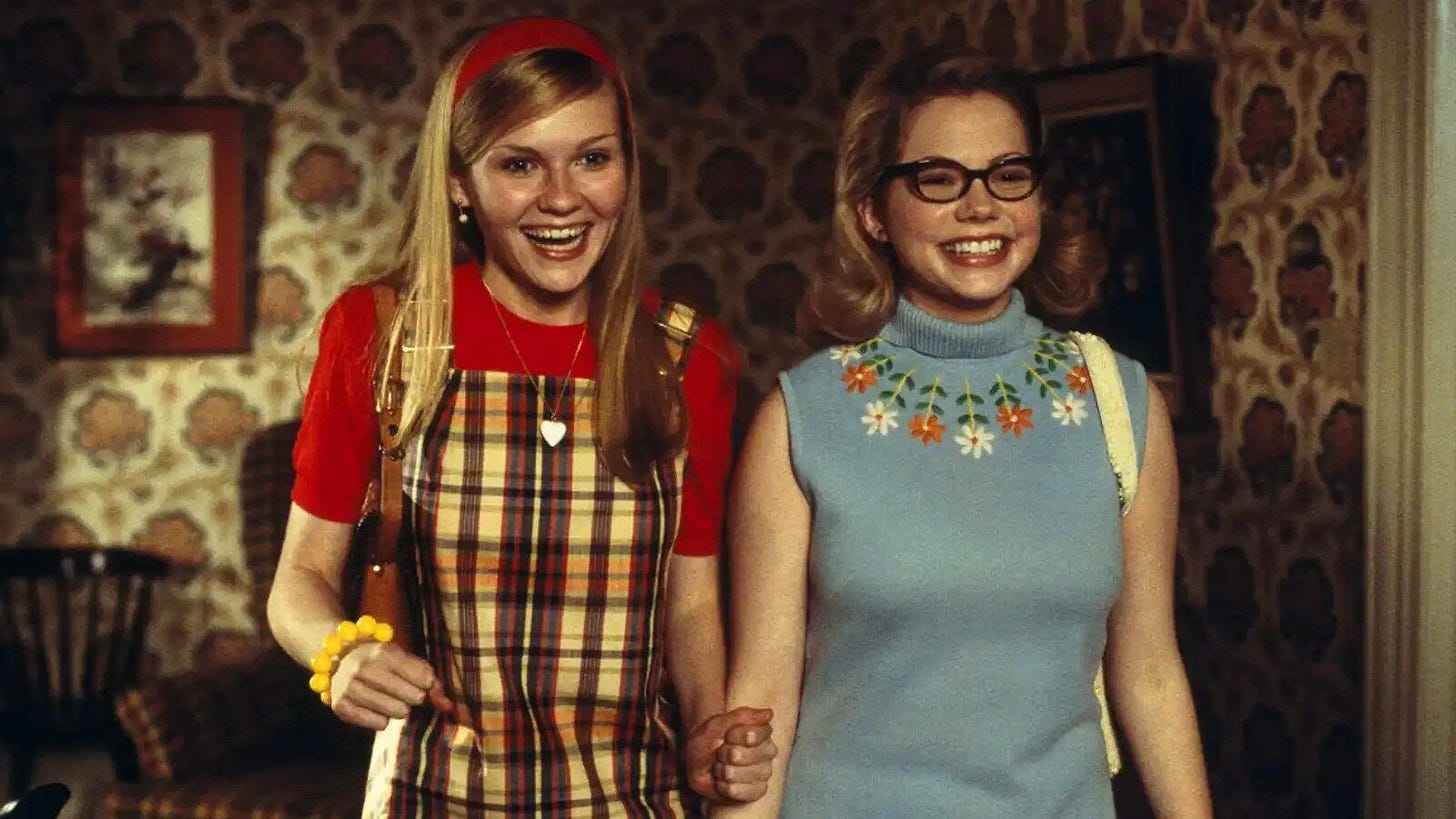I’m thrilled to announce that the month ahead is bringing subscribers across New York and LA the opportunity to see my favorite watch of summer 2023 and arguably the ultimate Watergate film, Dick (1999), on the big screen. HBD America and Eva Marie Saint, I guess !!
Let’s get into it:
July Book Selections
Peak summer vibes, and some beach reads (but not in a C*lleen H*over way).
Recommendations for the month ahead include:
The Summer Book by Tove Jansson (1971) — The perfect summer novel that will make you want to call and/or hug your grandma. I reviewed this book last August, writing:
Written by Moomins mastermind Tove Jansson in the wake of losing her mother, The Summer Book weaves a portrait of the thin line between humans and nature, life and death, through a series of 22 vignettes. Each one follows a summertime adventure undertaken by a girl named Sophia and her grandmother, both of whom reside on a remote Finnish island with Sophia’s father. The seemingly recent death of Sophia’s mother garners a two-line mention near the book’s beginning, setting its emotional undertone: “One time in April, there was a full moon, and the sea was covered with ice. Sophia woke up and remembered that they had come back to the island and that she had a bed to herself because her mother was dead.”
This book is, simply put, incredibly special…Jansson crafts lyrical prose (translated from Swedish by Thomas Teal) that captures tragedy and comedy in equal measure, presenting extreme youth and old age as parallel experiences marked by supervision and play. In one particularly entertaining scene at the beach, Sophia’s father goes swimming, and Grandmother sneaks off for a cigarette. Sophia finds her and promises not to tell, cementing them as co-conspirators in a world where adults — adults ages 18 to 65, that is — hold the power. The two go on to weather storms both literal and metaphorical throughout the elliptical narrative. One sequence shows Sophia and Grandmother building a miniature representation of Venice in a marsh pool, relying on Grandmother’s memories of past travel to construct streets and landmarks out of wood and stone. When a storm destroys it, humanity at the mercy of nature, Grandmother rebuilds to shield Sophia from the truth.
Jansson distills the crystalline fear, sheer anxiety, that bubbles in children marked by trauma. In one chapter, Sophia insists on sleeping with her father’s ratted old robe, gripped with fear that he may not make it through a storm, back to the island. Death lurks beneath life, its weight pressing against the story ubiquitously, consistently. At another point, the narrator recounts: “Sophia picked up some flowers and held them in her hand until they got warm and unpleasant; then she put them down on her grandmother and asked how God could keep track of all the people who prayed at the same time.”
The Summer Book functions as a meditation on memory — and a memory itself. Taking place across multiple summers in no particular order, the various vignettes weave and memorialize moments that transcend, stay freed from, the confines of time. Within that, the novel reveals how meaning can fade with age. One particularly poignant sequence reveals that Grandmother “had been a Scout leader when she was young, and, in fact, it was thanks to her that little girls were even allowed to be Scouts in those days.” When Sophia urges Grandmother to tell her more in the midst of a camping expedition, the narrator reveals: “A very long time ago, Grandmother had wanted to tell about all the things they did, but no one had bothered to ask. And now she had lost the urge.” Grandmother goes on to ruminate: “And unless I tell it because I want to, it’s as if it never happened; it gets closed off and then it’s lost.” Jansson makes the case for storytelling — specifically, the “urge” to tell stories — as the antidote for loss.”
The Last Picture Show by Larry McMurtry (1966) — In January, I ranked The Last Picture Show as one of my top reads of 2023, writing: “The basis for…one of my favorite movies, this semi-autobiographical novel by Larry McMurtry traces the story of a small town in Texas and its inhabitants, operating more like a collection of compelling character studies than a book with a straight-through plot line. As someone who loves a ‘no plot, just vibes’ novel, this one hit.”
While other people meander in and out of the narrative, The Last Picture Show, at its core, teases out a summer love triangle between recent high school graduates Duane Jackson, Sonny Crawford, and Jacy Farrow. Per Groovy History, the book “is set in Thalia, Texas, although it was based on McMurtry’s hometown of Archer City, Texas. McMurtry has claimed that the characters in the novel are not based on any specific individuals, and some believe that Duane Jackson is based on McMurtry himself. The locations are easy to distinguish though; for example, the movie theater in the film was based on the Royal Theater in Archer City and in the town itself, ranching and oil were (and still are) the dominant industries.” Heat shapes the texture of Thalia, elicits a kind of aimlessness that distinguishes the novel (“Heat waves shimmered above the green cabbage fields. Despite the sun and heat Duane soon went to sleep again and slept heavily, wallowing in his own sweat.”).
Written in third person, the prose maintains a mournful undertone as it examines a cyclical town filled with predetermined futures. McMurtry’s depiction of Ruth Popper, the football coach’s wife, serves as arguably the most poignant example (“She tried to look at him with whorish gaiety, but somehow it didn’t work; the smile was without life, and it showed her gums.”). She embarks on an affair with Sonny, well aware that their ages and respective relationship statuses can only spell doom (“When Ruth got home she began to tremble. She carried the blue quilt across the hot yard and stuffed it in the garbage can. She could think of no reason why anyone should desire her or want to know her or touch her, and she didn’t expect to touch or make love to anyone she cared about as long as she lived. It was a terrible feeling, knowing she would never really touch anyone again.”).
Meanwhile, Jacy (played by Cybill Shepherd in the film version, a nuanced representation of Women’s Wrongs) embodies the byproduct of an upbringing predicated on the importance of external perception, of male validation. For instance, in one scene, she sleeps with an older man in a pool hall, enraptured with the idea of the experience rather than the moment itself (“He was just going on, absorbed in himself, moving, nudging, thrusting — she was no more than an object. She wanted to protest that, but before she could she began to lose sight of herself, lose hold of herself…But it was such a romantic situation, screwing in a pool hall, that surely being in love would follow.”). She has little to no understanding of her feelings or body, a lack of awareness that propels a solid portion of the narrative’s dramatic tension.
Toward the end of the novel, the start of the school year, Sonny attends a high school football game. In an elegiac moment, McMurtry writes: “When the band played the Thalia school song it was a little thrilling: it touched something in Sonny and made him feel as though he was part of it again, the high school, football, the really important part of life in the town. It would have been better if he had never felt that way, because as soon as the game started he realized he was not part of it at all.” The closing of the town movie theater, a screening of “the last picture show,” dovetails with the story’s conclusion; Thalia stands on the precipice of change while the collective culture of its residents, the possibilities of small-town Texas, stay stagnant.
Call Me By Your Name by André Aciman (2007) — Unless you lived under a rock in 2017, the narrative of this novel requires no introduction. But, ICYMI: Call Me By Your Name famously takes place in Northern Italy over the summer of 1983, zeroing in on the relationship between Elio Perlman (played by Timothée Chalamet in the Luca Guadagnino adaptation), the son of professors, and his parents’ doctoral student of the summer, Oliver (played by a pre-cancellation Armie Hammer in the 2017 film version).
Written in first person from Elio’s perspective, Call Me By Your Name captures the intoxication of first love, the second-to-second sensations that come with navigating an especially intense crush (“And yet, out of the blue, a tender moment would erupt so suddenly between us that the words I longed to tell him would almost slip out of my mouth.”). Its verbosity evokes a lust-laden mood, with the prose more or less a mirror of the stream of consciousness that shapes erotic fixation. Aciman has juxtaposed sentences long and short, leveraging commas to mirror a never-ending loop of thoughts (“I should learn to avoid him, sever each tie, one by one, as neurosurgeons do when they split one neuron from another, one thought-tormented wish from the next, stop going to the back garden, stop spying, stop heading to town at night, wean myself a bit a time each day, like an addict, one day, one hour, one minute, one slop-infested second after the other. It could be done.”).
The novel ultimately adopts a kaleidoscopic lens to contextualize its central romance over the span of twenty years. Time flattens over the course of the narrative, with Aciman eliciting a sense of suspension (“When I think back to that summer, I can never sort the sequence of events. There are a few key scenes. Otherwise, all I remember are the ‘repeat’ moments. The morning ritual before or after breakfast…lunch at the large, shaded dining table in the other garden…the afternoon hours, splendid and lush with abundant sun and silence.”). Its characters move on with their lives on paper, but their emotional life stays somewhat trapped, forever contained in the confines of Italian summer.
Watergate: A New History by Garrett M. Graff (2023) — Nothing says “HBD America” like learning about one of its biggest political breaking points! Journalist Garrett M. Graff first became widely known in 2019, when he published The Only Plane in the Sky: An Oral History of 9/11, which I recommended last September. His follow-up comes in the form of what Simon & Schuster calls “the first definitive narrative history of Watergate,” the most direct and digestible account of the incident I’ve come across to date.
If you’re close to me in age (I turned 30 in March), you probably had the shared experience of U.S. history teachers glossing over everything post-World War II for the sake of time. As a result, most of my knowledge of Watergate stems from All The President’s Men (1976), hearsay, Wikipedia rabbit holes, vague references from Boomers, and Dick (1999). So, needless to say, Graff’s account has helped gradually paint a more detailed picture of the Nixon administration’s downfall.
I’ve been reading this book, which comes in at over 800 pages, very slowly over the course of the past year or so. I personally struggle to digest information via audiobook, but would highly recommend checking out this one in that form if you can!
Animal by Lisa Taddeo (2021) — The perfect pool read! I borrowed my friend Ama’s galley of this debut novel from Lisa Taddeo — author of the summer 2019 sensation, Three Women — over Fourth of July weekend a few years ago and couldn’t put it down.
Told in first person, Animal inhabits the head of Joan, a scathing, 30-something antiheroine who, spurred by her married lover’s suicide, makes the move from New York to LA in search of answers around the death of her parents decades earlier. Its opening sentence sets its Lynchian tone, introduces the notion of a narrative fraught with violence (“I drove myself out of New York City, where a man shot himself in front of me.”). Per Kirkus Reviews: “She [Joan] rents a little house in Topanga Canyon on a large piece of property that is also home to a well-known rapper, a hot guy in a yurt, and a wealthy older man who has recently lost his wife. Once unpacked, she almost immediately runs into the person she went there looking for…Taddeo balances the sex, violence, and melodrama of her plot with insightful character development…If the story goes off the rails in the final chapters, the burning questions driving it are satisfyingly answered. As full of sensuality, amorality, and drama as its riveting narrator.”
Upcoming Content to Consume
Film Forum: Eva Marie Saint 100th Birthday Celebration (Date: 7.4) — On July 4th, iconic American actress Eva Marie Saint — whose career spans from the Golden Age of Hollywood to the cult 80s series, Moonlighting — turns 100! To celebrate her birthday, Film Forum will screen two of her most memorable films: On the Waterfront (1954), which I reviewed back in October, and North by Northwest (1959).
Cinespia at Hollywood Forever Cemetery: Firework Screenings (Dates: 7.4-7.6) — Every year, Cinespia rings in Fourth of July weekend with a set of screenings that include a firework show over Hollywood Forever Cemetery. This year, the series will run three nights instead of two, with the outdoor theater showing Rocky (1976), Charlie’s Angels (2000), and Shrek 2 (2004). Pick your poison and pack a picnic!
Metrograph’s Summer at Sea Series (Opening Date: 7.5) — Take a mental vacation at Metrograph this month through the theater’s upcoming Summer at Sea series! Per the site, the line-up will feature “films set at the shore or on the open water, boasting sweaty, sun-dappled, sand-in-the-toes cinema by Christian Petzold, Wes Anderson, Lina Wertmüller, Ingmar Bergman, and many more. An invigorating gulp of ocean air for the days and nights when you’re stuck in the sticky city, including slapstick comedies, erotic idylls, and plenty of gut-wrenching dramas.”
I’m personally planning to see Before Midnight (2013), completing my inaugural viewing of Richard Linklater’s Before trilogy (more on that in the June Movie Review), as well as Bonjour Tristesse (1958), based on the 1954 debut novel of then-18-year-old Françoise Sagan that I read back in 2022.
BAM: Two Women: Early Films of Sissy Spacek and Shelley Duvall (Dates: 7.5-7.10)— This month, Brooklyn Academy of Music (BAM) will screen a series dedicated to two of the 1970s’ most important actresses, Sissy Spacek and Shelley Duvall. Spacek first broke onto the scene with Terrence Malik’s Badlands (1973) before becoming a household name for her titular, Oscar-nominated turn in Carrie (1976). Meanwhile, Duvall collaborated with iconic New Hollywood director Robert Altman on Brewster McCloud (1970), McCabe & Mrs. Miller (1971), and Thieves Like Us (1974), followed by her breakthrough role in Nashville (1975).
Altman brought the two women together for his 1977 film, 3 Women. As I wrote when Metrograph screened it back in May, “3 Women stars Shelley Duvall, Sissy Spacek, and Janice Rule as — you guessed it — three women, all brought together at a health spa in the California desert. Writer and director Robert Altman quite literally dreamed up the film, then got it green lit without a full script thanks to the success of past projects like M*A*S*H (1970), The Long Goodbye (1973), which I reviewed back in January, and Nashville (1975). While his dreams [the night his wife was hospitalized]…didn’t provide the film’s story, they gave him the specific vision of making a film called 3 Women starring Shelley Duvall and Sissy Spacek, set in the California desert, and centering on the theft of someone’s personality. He was raring to get started as soon as he woke up.”
BAM’s line-up includes personal favorites like Badlands (1973), Carrie (1976), and The Shining (1980), which I reviewed back in October, as well as films on my to-watch list like Brewster McCloud (1970) and 3 Women (1977).
New Beverly Cinema: Rope (1948) and Dial M for Murder (1954) Double Feature (Dates: 7.6-7.7) — An ideal Hitchcock double feature for my LA subscribers! I discussed Rope (1948) back in the May Movie Review, and Dial M for Murder (1954) marks one of my favorite movies from the Master of Suspense (alongside Shadow of a Doubt (1943), Strangers on a Train (1951), and Rear Window (1954), if you’re curious). It centers on a plot hatched by ex-tennis pro Tony Wendice (played by Ray Milland; what is it with Hitchock and tennis?) to have his wealthy, adulterous wife, Margot (played by Grace Kelly) murdered and get his hands on her inheritance.
McNally Jackson Seaport: Gary Indiana Presents I Can Give You Anything But Love (2015) (Date: 7.12) — This month, Gary Indiana will discuss his 2015 memoir, I Can Give You Anything But Love, at McNally Jackson Seaport. For those of you unfamiliar with him, Indiana emerged as one of the seminal cultural figures in 1980s New York, amassing a reputation for his literary fiction, plays, and art criticism. He served as The Village Voice’s Art Critic from 1985 to 1988, transcending the East Village scene to impact the American collective conscience with his true crime trilogy, Resentment (1997), Three Month Fever: The Andrew Cunanan Story (1999), and Depraved Indifference (2002).
The LA Times aptly describes Indiana as “the connective tissue that binds together a diaspora of subcultures: the beatnik-era experimental writing and happenings of downtown New York, the 1960s co-opted counterculture gone awry, the punk movement that followed, and the art and intellectual circles of the Reagan 80s, when the AIDS crisis was wiping out a generation of young gay men like him.” Why Indiana plans to speak about this memoir nine years after its publication, I’m not entirely sure (perhaps because McNally Editions reissued Indiana’s 1994 novel, Rent Boy, last year?). But, I’m not one to look a gift horse in the mouth.
Elizabeth Street Garden Movie Night: After Hours (1985) (Date: 7.24) — First things first, ICYMI: beloved Nolita green space Elizabeth Street Garden has remained embroiled in a fight with the city to prevent its demolition for years. Last month, it got dealt a heavy blow when a group of judges ruled in favor of the developer looking to build affordable housing on the lot. Elizabeth Street Garden’s advocates have outlined alternative options in the area, making the crucial case that green space and affordable housing can — and should — coexist for the good of the community. For my New York-based subscribers, please consider joining the garden’s letter-writing campaign to Mayor Eric Adams here and encouraging friends to do the same.
Now, enjoy what hopefully won’t be the last summer of community programming — which includes everything from outdoor yoga to film screenings to poetry in partnership with McNally Jackson — at Elizabeth Street Garden. My movie pick for July is After Hours (1985), a locally-set black comedy starring Griffin Dunne (more on him coming up in the June Book and Movie Reviews) as Paul Hackett, a suit trying to make his way back uptown from SoHo in a pre-cell phone era. I had the pleasure of seeing Dunne speak about his experience filming the lesser known Scorsese cult classic — which provides a dark, twisty peek into the yuppie-artist binary of 1980s New York — at The Paris Theater last year.
Film at Lincoln Center’s Summer for the City Outdoor Film Series: Dick (1999) (Date: 7.25)— Not to be dramatic, but my summer 2023 really peaked with the afternoon I spent seeing Dick (1999) at Metrograph. As I wrote in last year’s August Movie Review:
This SNL-style retelling of Watergate premiered in 1999, notably before Mark Felt came forward as Deep Throat, the notorious anonymous source that helped Washington Post reporters Bob Woodward and Carl Bernstein take down the Nixon administration, in 2005. With that anonymity still looming in the public consciousness at the time of its premiere, the film poses a crucial question: what if a Virgin Suicides-era Kirsten Dunst and Dawson’s Creek-era Michelle Williams were Deep Throat?
Dick centers on two teenage girls, Betsy Jobs (played by Dunst) and Arlene Lorenzo (played by Williams), the latter of whom lives in the Watergate complex with her single mother. The night of the notorious break-in, the duo slips out to mail a letter, entering Arlene to win a date with the teen idol singer whose face smothers her bedroom walls. To sneak back into the building without having to buzz up — and risk getting caught by Arlene’s mom —, they tape over the lock. This seemingly insignificant action leads to security guard Frank Wills’s infamous entry into the Watergate complex’s logbook (“1:47 AM: Found tape on doors; call police.”) and the subsequent arrest of the five men who set out to bug and burglarize the Democratic National Committee offices that same night.
Forrest Gump meets Clueless meets All the President’s Men, the political satire that follows shows just how far notoriously paranoid Nixon would go to keep his friends close and his enemies closer. Recognized on a school trip to the White House, Betsy and Arlene get tapped to become “secret youth advisors” to the president (played flawlessly by Dan Hedaya, aka: Cher’s dad from Clueless). The film shows how they might have shaped moments as minute as Nixon’s infamous double peace sign pose and as major as the Nixon–Brezhnev accord…This movie is first and foremost a great time. The closing credits inexplicably show Dunst and Williams rollerblading around the Oval Office while “Dancing Queen” by ABBA blares. (Five stars, no notes.) So, I don’t want to make it deeper than it needs to be. That said, I love any content that sheds light on society’s underestimation of young women — and how that ignorance allows them to slip into places they might not otherwise be allowed. Marlowe Granados’s 2021 novel, Happy Hour, is predicated on this exact concept, and I would place Dick in the same canon.
Now, the movie will screen outdoors on 7.25 as part of Lincoln Center’s Summer for the City series. You can reserve free seating the Monday before the event at noon using this link!
Film Forum: Eno (2024) (Dates: 7.12-7.25) — Directed by Gary Hustwit, this documentary about Roxy Music member and Gen X god Brian Eno premiered at Sundance to rave reviews back in January, now holding a 100% score on Rotten Tomatoes. It opens at Film Forum later this month, with a computer program set to live edit the film so that a different version plays at each screening.
In his Rolling Stone review, David Fear writes: “Brian Eno — former Roxy Music member, legendary recording producer, Berlin-era Bowie bestie, ambient music pioneer, and a man who rocked a Seventies kimono like no other — is not someone who likes dwelling on the past or being pinned down. The idea of a movie chronicling his 50-year career behind the keyboards and mixing boards, much less one involving his participation, feels counterintuitive to him…Hustwit proposed something different. He’d been talking to a programmer about software that would be able to remix film footage in real time. The feature would be fully edited and completed, mind you. But if you ran the work through this program, it would rejigger the order of the sequences at random. Certain scenes would be ‘pinned’ at the beginning and the end, per the director. Everything else, from the chronology to what was or was not included within a two-hour timeframe, could be left to chance…Applied to a conceptual musician like Brian Eno, who couldn’t play an instrument when he joined Roxy Music but took up the synthesizer because it was new and thus ‘there were no rules on how not to play it,’ the approach feels like it might be the only way to properly talk about Eno.”
New Beverly Cinema: All the President’s Men (1976) and Dick (1999) Double Feature (Dates: 7.30-7.31) — As I wrote in last year’s August Movie Review, “All All The President's Men (1976) walked so Dick (1999) could rollerblade to ABBA.”
For my LA subscribers, check out these two cinematic masterpieces — and very different reflections on Watergate and its impression on the American collective conscience — back to back at Tarantino’s revival theater, then follow it up by starting Garrett M. Graff’s Watergate: A New History (2023).
Elizabeth Street Garden: Poetry with McNally Jackson (Timing: ongoing in July)— Elizabeth Street Garden has teamed up with McNally Jackson to showcase New York-based poets at weekly readings in the garden, happening through September on Sundays at 4:00 PM!
Miscellaneous Musings
Why is Brideshead Revisited (1982) So Long?— As you’ll learn in the June Book Review, like Donna Tartt’s college friend group before me, I have entered my Brideshead Revisited hyperfixation era. Once I finished reading Evelyn Waugh’s 1945 novel, I started the critically acclaimed and cult favorite ITV series that had a chokehold on (sub)culture(s) in the early 1980s. So far, the series has lived up to The Telegraph’s 2015 characterization of it as “utterly faithful to Evelyn Waugh's novel yet it's somehow more than that, too.” It is, unfortunately, also psychotically long, with episodes clocking over an hour and and a half.
If you want Brideshead vibes without the 400-page novel commitment, you can stream the 1981 series for free on Amazon Prime Video with a Britbox subscription. If you want Brideshead vibes without spending 10+ hours in front of your television, pick up the novel from a local bookstore or order it on Bookshop.org.
More Lisa Taddeo — If you want to dip a toe into Animal without committing to the full novel, Lisa Taddeo teased out an earlier iteration of her debut novel’s narrator, Joan, in “Forty-Two,” which The New England Review published back in 2015. The piece ultimately made its way into Taddeo’s short story collection, Ghost Lover (2022). You can check it out here!
Supplemental Reading
As always, don’t forget to use archive.ph if you can’t access these pieces or any of the ones throughout my Substack!
The Creative Independent: On conversations with friends as a source of inspiration
Vanity Fair: Inside the Making of Brideshead Revisited, the Original British TV Obsession
Los Angeles Times: Writer Gary Indiana on his new memoir, Susan Sontag and why he hates the ‘80s
The Hollywood Reporter: Dick Director on Challenges of Making a Watergate Comedy and Whether It Could Be Done Today
Texas Monthly: The Ghosts of Archer City: How The Last Picture Show Changed the World’s View of Small Town Texas
Cocktail of the Month
If you know me IRL, you know my favorite cocktail is a Paper Plane, which I featured as the Cocktail of the Month in the first newsletter. A new summer spin on the drink has recently come to my attention in the form of the…
Cherry Paper Plane —
Slice and remove the pits of four cherries, then muddle them in a cocktail shaker with one ounce of bourbon. Add ice, followed by one ounce each of Aperol, Amaro Nonino, and lemon juice.
Shake and serve chilled in a coupe glass.
That’s all for now! Stay tuned for the June Book and Movie Reviews, which will include thoughts on Brideshead Revisited, Richard Linklater’s Before trilogy, and more. As a bit of a teaser, I linked some related articles in the Supplemental Reading section.
xo,
Najet


